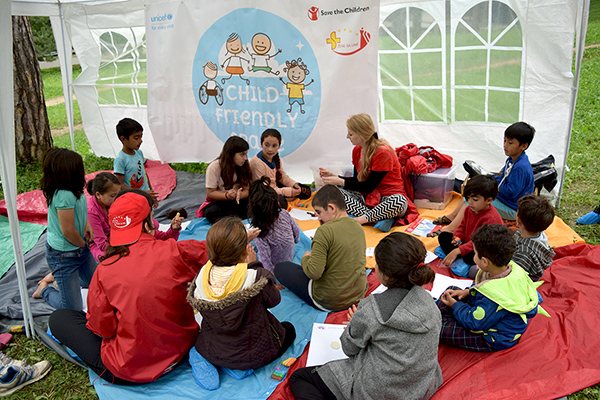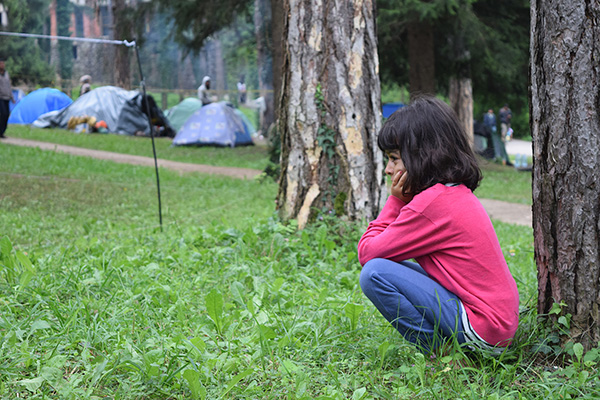 North West Balkans
North West Balkans
Languages
#BosnianRoute: The cruel fate of children on the move
Source: BIRN
They are called “children on the move”. Children who have been travelling for years to reach a country where, as they’ve been told, “they will be just fine ...”. Children born to travel, separated from their parents. They set out, voluntarily or involuntarily - it makes no difference - condemned to a cruel childhood, deprived of a home, safety and right to education.
Author: Dilajla Obajdin
The term “children on the move” describes the phenomenon of migrating children, i.e. the children who move from their place of residence to another place. They are, actually - children. Children we do not pay much attention to, though, despite the fact they are one of the most vulnerable groups exposed to risks of inadequate care, economic and sexual exploitation, abuse, neglect and violence when on the move.
The OSCE Mission to BiH has published the total number of registered migrants in BiH: from January to end-July, there were 10,145 were registered. Among them, there were 175 children who were unaccompanied or separated from their parents or caregivers.
Who are these children? The country of origin and personal particulars, including the age, are entered into records as stated by the migrants since most of them have no identification documents. According to the International Organisation for Migrations (IOM), the countries of origin include mainly Pakistan, Syria, Afghanistan, Iran and Iraq. It is difficult to verify their age.
“They tend to give a false age. That’s what elder brothers or cousins tend to do fearing they would be separated from the younger members of the family”, said Ms. Alma Pezerović, talking about the experiences Save the Children already had in Croatia, where she had been engaged before she arrived in Bihać, a city with the biggest influx of migrants in BiH.
“More often than not, the local population perceives large groups of young migrant boys negatively. The truth is, in most of the cases, they were sent away by their parents. In Afghanistan and Pakistan, parents often send their sons away from home, advising them to travel to EU countries when they are 15 or 16 years old, the age of military recruitment. Most of them remain in touch with their parents, who saw this as the only way to save their children”, said Ms. Pezerović underlining the potential threat of abuse of migrant children as already seen in other countries.
“It happens,” said Ms. Pezerović, “that smugglers mingle with migrant children and then persuade them to let them come along, where they pose as a company or cousins of the children.
For the purpose of a systemic approach to this problem, the key role in the protection of such children is that of social work centres, which must appoint a guardian to an unaccompanied child to represent them before BiH authorities. They are vested with the authority to ensure their protection under family law, child protection, social welfare and the protection of the family from violence and juvenile delinquency.
They have an extremely difficult task of taking care of yet another vulnerable group without sufficient human and financial resources, along with all other beneficiaries these social work centres already take care of in this poor country.
Fortunately, they met UNICEF’s understanding, which will finance employing social workers by the centres in the area with the greatest influx of migrants. UNICEF is willing to finance paediatric teams at the Hotel Sedra and is currently negotiating with the Federation Public Health Institute about the procurement of vaccines and immunisation of those children”, said the Ministry of Health and Social Policy of Una-Sana Canton (USK), which coordinates the activities concerning the accommodation of migrants.
There are no precise data on the number of children among the migrants in Bihać and Velika Kladuša. It is known that 186 children have been accommodated at the shelter at the Hotel Sedra, of whom nine babies and two families with children with disabilities. There are no records showing a clear number of children in the ruined building of the Students’ Dormitory in Bihać, or the dirty and equally ruined camp on a wasteland in Velika Kladuša.
Where the government fails to act, ordinary people do so. “Women of the Una River” have managed a safe house in Bihać for years, where they offer shelter to the victims of violence and implement projects advocating for the right to education. The experience in our work with the most vulnerable categories of the population proved to be valuable in the first days, when hundreds of families with children started arriving in Bihać, before the accommodation of children and families was organised at the Hotel Sedra.
With the support of Save the Children and the auspices of UNICEF, we set up a mobile safe corner for children, a work model Save the Children uses in crisis regions around the world. Every morning, our activists would start setting up the corner, in the park not far away from the house in Borići, and organise different creative workshops, and the little ones would come with joy”, said Aida Behrem, director of the association Women of the Una River, who opened a corner for moms on its premises in Bihać.
“It was important for mother with babies to have a place to come to and rest, change their babies, seek advice from a nurse, talk to someone, have a place where they are understood, accepted and helped”, said Ms. Behrem.
The safe house was a temporary accommodation for the most vulnerable migrants. Around 200 persons were temporarily accommodated there. Ms. Aida Behrem said that children were usually scared, not trusting anyone.
“When you work with them and are kind, talk to them, encourage them to play and learn, they transform. It’s difficult for me to describe the feeling when a child freely runs to you to hug you. This is what encourages you to engage in humanitarian work”, noted Ms. Behrem.
Migrants do not stay in Bihać and Velika Kladuša for long. Not even those with a decent accommodation and meals. They still endeavour to cross the border in desperate hope to reach EU countries. At the same time, they are generally unaware of the threat the mines on the roads they move along pose and of the fact that Una-Sana Canton is one of the most mine contaminated areas in BiH, in particular the areas near the border.
The text was produced with the support of the Independent Media Empowering Program (IMEP).

